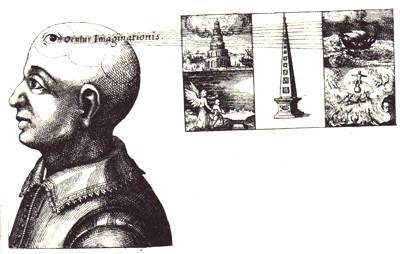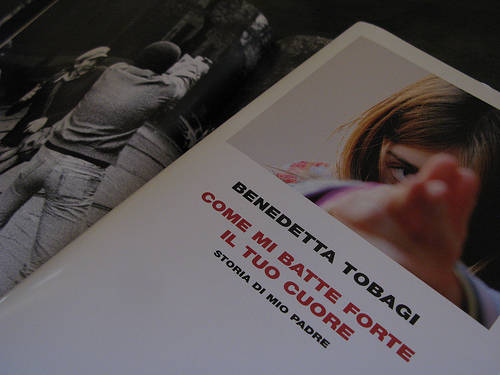Memory, History and the Literary Conscience
Memory, History and the Literary Conscience: "Libri come" in NYC
Jonathan Galassi's brilliant translation of Leopardi's "Canti" includes this excerpt from the canzone "La sera del dì di festa" [The Evening of the Holiday]. Young Giacomo strikes an operatic chord as nightfall on the village feast day celebration inspires him to contemplate the end of all things. As he visualizes the missing pages of history, his mind's eye is filled with the ruin littered fields of epochs past. "Where are those ancient peoples?", he cries. What has become of their clamorous battles, their stunning tragedies, their sparkling monuments? Silence falls like curtain over the theater of his hopes and dreams.
E fieramente mi si stringe il core,
A pensar come tutto al mondo passa,
E quasi orma non lascia. Ecco è fuggito
Il dì festivo, ed al festivo il giorno
Volgar succede, e se ne porta il tempo
Ogni umano accidente. Or dov’è il suono
Di que’ popoli antichi? or dov’è il grido
De’ nostri avi famosi, e il grande impero
Di quella Roma, e l’armi, e il fragorio
Che n’andò per la terra e l’oceano?
Tutto è pace e silenzio, e tutto posa
Il mondo, e più di lor non si ragiona.
and my heart is stricken
to think how everything in this world passes
and barely leaves a trace. Look,
the holiday is gone, the workday follows,
and time makes off with every human thing.
Where is the clamor of those ancient peoples?
Where is the renown
of our famed anscestors, and the great empire
of their Rome, her armies,
and the din she made on land and sea?
Everything is peace and quieto now,
the world is calm, and speaks no more of them.
Following an animated reading by Mr. Galassi himself, Benedetta Tobagi and Stefan Merrill Block concluded Radio3’s New York edition of the popular "Libri come" program with an impassioned investigation of the treacherous "silent peace" Leopardi laments in his poem.
Rosa Polacco, one of the festival curators, confessed that the idea to bring the two into conversation had occurred to her intuitively. As it turns out, Polacco's notion was fortuitous because together, the two exposed the multiplicity of ideas and meanings associated with the term "memory". What does memory mean to an individual, a family, a community, a nation? A tangle of neurons and sinuous membranes, the organic tissue of one's brain matter and, at the same time, a knot of names, places and dates – buildings and monuments – destined to decay and crumble. Geneology, archeology, historical record, collective memory, social memory, oral tradition, memoir, documentary, ritual, convention, commemoration. The ancient shadows of Homer, Plato and Virgil in these authors’ works seem to beckon us to consider the crossover point between personal stories and public history.
The act of remembering, as Benedetta and Stefan show us, is as much a search for humanity as it is for truth and facts. Benedetta’s memoir, whose title reads in a bold red: “Come mi batte forte il tuo cuore” (How Your Heart Beats Fast within Me) and in smaller, black print: “Storia di mio padre” (The Story of My Father), recounts her search for the father who was both famous and patently obscure. Too well known and, to his daughter - merely 3 years old when he was assassinated - virtually unknown. For the orphaned Benedetta, the facts, already problematic in their malleability, were soulless without the force of a familiar embrace or the venerable nuisance of paternal advice.
"È triste non ricordare il volto di una persona amata, ignorare quell’impasto di dettagli che la rende inconfondibile. Il modo di muovere le mani – mani larghe, ma dalle dita affusolate, come le mie -, la piega delle spalle, l’andatura, magari un tic, un vezzo. Particolari che le fotografie mostrano a malapena, gesti e attitudini appena suggeriti" (93).
"It is sad not to remember a loved one’s face, to be ignorant of that mixture of details which renders him unmistakable. The way he moves his hands – broad palms with tapered fingers, like my own -, the curve of his spine, his stride, maybe a twitch or a quirky habit. Details which scarcely show up in photographs; gestures and positions that are merely distant suggestions".
Likewise, Stefan’s fiction represents a recherche of sorts: for the tragic humanity at the heart of Alzheimer’s disease. His novel, "The Story of Forgetting", blends imaginary characters with scientific research and, one supposes, at least a bit of documentary testimony. Thus, it is not only a “story” about forgetting but also a “history” of the malady. We imagine the protagonist Seth to be the author’s courageous avatar – clearing the clinical cobwebs, ransacking the attic, confronting his father. Only Seth is looking for his mother: the person in which he originated and whose mystery he carries, written in his DNA. In other words, the facts alone are as cold and sterile as the nursing home where the ailing woman is confined. While interviewing a young lady who lost a loved one to the illness, Seth experiences a sudden rush of insight:
"My imagination of their sadness and hope; it was as if there had been a hollow, unfathomable dark place and their stories had held light to its walls, mapping its depths. (…) Maybe the point of my so-called empirical investigation had been as simple as that, to hear their stories and, by imagining the shapes of their burdens, to being to understand the shape of my own" (252).
It is perhaps fitting to conclude with one of Benedetta’s most moving discoveries. Among the young Walter’s notes, there are several letters which testify to his passion for journalism (“the most beautiful career in the world”). No topic or assignment was undesirable or uninteresting: “You get used to anything and everything. There is humanity in every situation, you just have to know how to find it and to appreciate its worth”(68). In short, in this world at least, the truth and the human are incontrovertibly linked.
It seems that Benedetta has taken these lessons to heart, as one of the founders of the Case della memoria (Houses of Memory), an initiative aimed at reconciling the victims of terrorism to nothing less than history itself and with the idea of creating and fostering a community of understanding – because, when one loses someone dear, the facts alone are wholly insufficient.
Jonathan Galassi is President and Publisher at Farrar, Strauss and Giroux where he has held various executive offices since 1985. His numerous translations from the Italian include the oeuvre of the poet Eugenio Montale. His translation of Leopardi's "Canti" is the first in over 50 years.
Benedetta Tobagi lives in Milan but travels frequently to speak to young people and to promote the Case della memoria initiatives she has enthusiastically embraced. She is pursuing a Ph.D. in Philosophy part-time at the University of Oxford in London. Her father, Walter Tobagi, a journalist for Corriere della Sera, was assassinated by a member of the Red Brigades in 1980. The circumstances surrounding his death – and the reason for his targeting – remain unresolved. Her book is also an investigation of the colossal scandal which may have led to his death.
Stefan Merrill Block lives in Brooklyn, NY. His debut novel, "The Story of Forgetting" - written at the age of 26 - was an international bestseller. Enormously popular in Italy, the book captured the attention of Walter Veltroni who penned a laudatory review. Growing up, Block helped to care for his grandmother who suffered with familial Alzheimer’s. He very recently concluded a second manuscript on his grandfather's life. The author attended Washington University of St. Louis and, when he isn’t writing, he makes documentary films.








































i-Italy
Facebook
Google+
This work may not be reproduced, in whole or in part, without prior written permission.
Questo lavoro non può essere riprodotto, in tutto o in parte, senza permesso scritto.